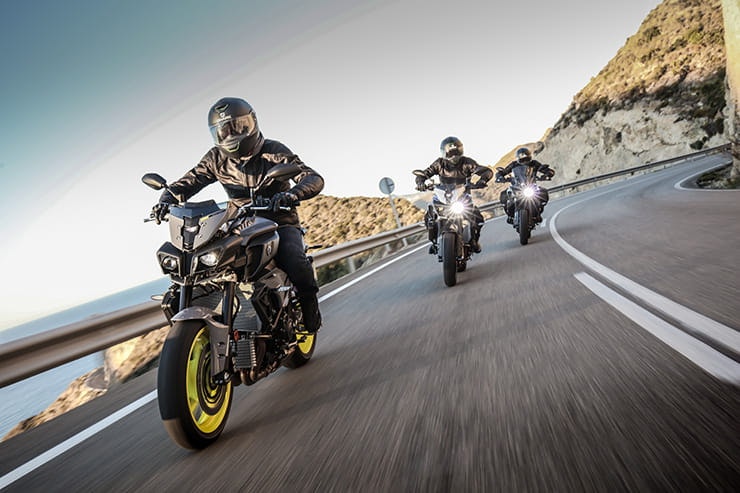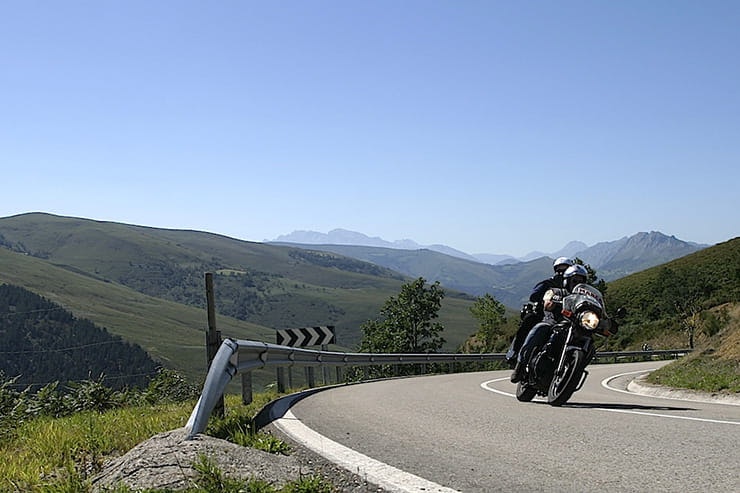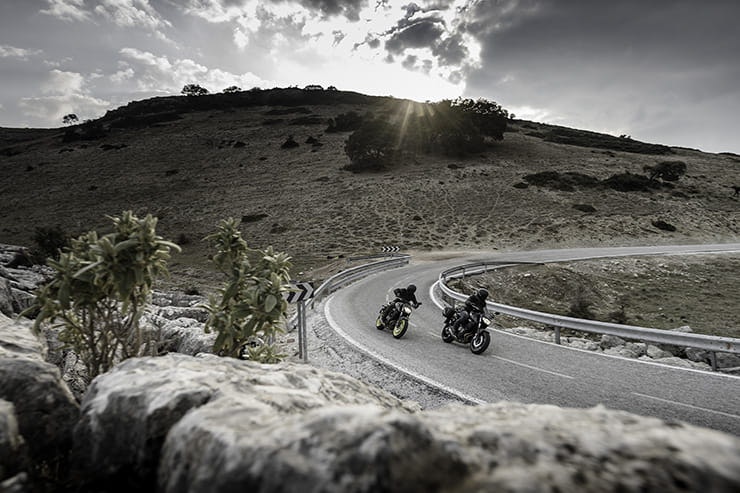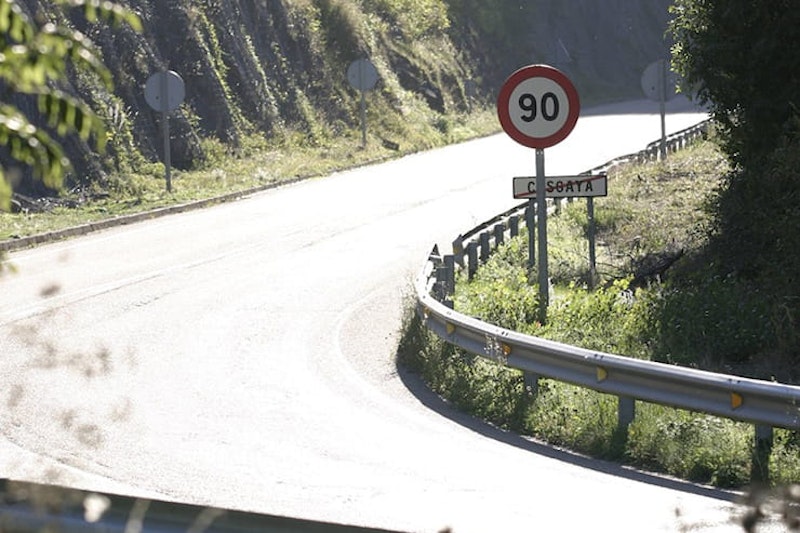Motorcycle touring in Spain
By Kev Raymond
Motorcycle Journalist
23.01.2026
From the Picos de Europa mountains in the north, to the Straits of Gibraltar in the south; the plains of the centre to the tourist traps of the Mediterranean, Spain's got a lot to offer. It's a big country with a relatively small population, and most of that is concentrated on a few big population centres, so the vast majority is virtually empty. Fantastic roads, stunning scenery, and great food. But there are also a few potential problems for the unwary traveller, so here's our guide to the rules and regulations you need to know…
For a full checklist of paperwork and equipment needed to ride in the EU post-Brexit, see our guide here.
New 2026 rules for stationary traffic in Spain
As of early 2026, Spain has introduced a German style obligation to create a lane for emergency vehicles when traffic is at a standstill on multi-lane roads – vehicles in the right lane go as far to the right as possible, those in the left lane go as far left as possible. This is not an invitation for you to blast down the middle....
Speed limits are similar in Spain to the UK, but you need to be aware of where they apply
Speed limits in Spain
The general limit on normal roads (with no central separation or hard shoulder) out of town is 90km/h (55mph) unless signed otherwise. If there's a second lane in one direction (usually a short overtaking lane) that goes up to 100km/h (60mph), and the same applies to roads with a hard shoulder each side. Motorways are 120km/h (75mph) although there is talk of increasing that to 130km/h (80mph) at some point.
There are also currently (April 2025) trials under way in Catalonia to allow speeds of up to 150km/h on some stretches of motorway, with variable speed limits controlled by AI technology. Whether that will be rolled out across Spain later remains to be seen.
Urban speed limits got a big shake-up a few years back. Single lane roads with a pavement alongside are now limited to 20kmh (12mph), two-way roads with one lane in each direction are now limited to 30km/h (18mph), and only on roads with two or more lanes each way are you allowed to reach the heady heights of 50km/h (30mph), down from the former 80km/h (50mph). You can expect these limits to be widely ignored by the locals, but you can also expect to be fined heavily if you're caught doing the same.
In small towns and villages there are often speed sensors on the way in. If you're within the limit, no problem. If you're over the limit they automatically turn the next set of traffic lights red, so you're held up for longer than if you'd stuck to the limit in the first place. Simple but effective.
While it’s not speed-related, it’s worth knowing if you have an older bike that you must ride with dipped beam on at all times. Daytime Running Lights are fine (though not at night, obviously).
What’s the law on overtaking in Spain?
In the old days Spain operated a sensible rule that allowed you to increase speed by up to 20km/h (12mph) over the limit in order to overtake slower traffic. Unfortunately, that law was revoked a few years back, so now in theory you can only overtake if you can do so without exceeding the posted limit. Yeah, right.
In the last few years new rules have also been put in place to protect cyclists from other road users. If you have to overtake a cyclist or a group of cyclists, you must leave at least 1.5m of clearance, AND reduce your speed by 20kmh. It's worth noting that you can cross a white line to overtake cyclists if there's nothing coming the other way, but you’re not allowed to overtake at all if there are cyclists coming the other way. This is important because in many areas you'll come across a LOT of cyclists, especially in the early part of the year. Early season training camps attract amateurs and pro riders alike to places like Calpe/Benidorm and anywhere else with access to cheap hotels and quiet roads. Be aware also that on some twisty mountain descents cyclists might well be faster than you, so keep an eye on your mirrors...
Can you ride in Spanish bus lanes?
In some places (mostly Barcelona and Madrid, but there are others), there are dedicated bus lanes, marked 'BUS-VAO'. VAO is short for the Spanish for High Occupancy Vehicles, which includes bikes, so you're allowed to use these lanes. Watch out for the buses though; they don't slow down for much...
Documents required to ride in Spain
The same as for most of Europe. You need your driving licence (plus 1968 pattern International Driving Permit if you still have a paper licence or one issued by the Isle of Man, Gibralter or Channel Islands), passport (issued less than 10 years previously and with more than three months left to run on your return date), registration document (and form V103 from your finance company if appropriate) and proof of insurance (you no longer need a Green Card). You must be able to present the originals of any of these on demand if pulled over – failure to do so is punishable by an immediate fine.
Do I need travel insurance?
Just like any holiday, a trip on a motorcycle – be it in the UK, Europe or beyond – can be ruined by delays, lost documents, illness and more. There are plenty of travel insurance options, but you need to make sure you get a policy that includes riding motorcycles, and if it does, that it's for bikes of the engine size you'll be riding (many only cover up to 250cc). At its most basic, you should look for insurance that provides cover for the following:
Medical expenses
Loss or theft of personal possessions
Lost or delayed luggage
Loss of your passport and other documents
Travel delays and disruptions
Having to cut your holiday short
In addition though, if you’re taking a motorcycle (or you're renting one while you’re away) be sure that your insurer will cover you for any medical expenses, should you have an accident. You must also think about where you’re riding – some policies won’t cover you if you’re trail or enduro riding, or if you’re on a race-track. Remember – this isn’t about your bike being covered, it’s about your medical expenses, should the worst happen.
If you're only going away once, a single-trip policy will likely be all you need, but also consider an annual policy, which could extend to cover your family holidays too (a good insurer should also be able to offer cover for your whole family).
What about breakdown cover?
Breakdown insurance is highly recommended. Read the small print though; many policies insist you buy cover for the entire journey, so cover must include the day that you leave home and not just begin as you land overseas, or you may find you have no cover at all.
You'd be mad not to carry a valid GHIC card as well, which gives you access to free emergency medical care. If you haven't already got one, you can apply for the GHIC here. Even with a GHIC though, it's also recommended to take out separate medical insurance including repatriation (see above).
What you must take with you to Spain
You must carry a hi-vis gilet or jacket at all times, although you only need to wear it if you're actually stopped by the side of the road.
If you need glasses for riding, you must carry a spare pair as well (look on the bright side - if you lose one pair, the second pair will help you find them).
You need a UK sticker on the bike.
Since 2024 it's now a legal requirement for both rider and passenger to wear proper CE-approved gloves while riding. Many sources also say that open face helmets are now banned, and only full-face and modular (flip front) lids are allowed. However at time of writing (April 2025) it appears that the new rule is still at the proposal stage and hasn't passed into law yet. We'll keep you updated on that one.
You must ride with a dipped headlight / Daytime Running Light during the day.
You may have read elsewhere that as of this year you're required to carry a 'V-16' electronic beacon for use in the event of breakdown or accident. The beacon flashes emergency lights but also connects wirelessly to a central register and tells the emergency services – and other local motorists – that you're stranded. That's true for cars and trucks, but not for bikes – for the moment at least, although it's recommended that you carry one, it's not compulsory. However... they'e quite cheap, very small and compact, and given how deserted much of Spain's road network is (especially the fun bits) it might not be a bad idea anyway, if you've got a bit of spare space.
Do you need a V16 DGT 3.0 beacon on your motorcycle
From January 2026, 'all vehicles' must carry a V16 flashing emergency light that's connected to the Dirección General de Tráfico (DGT) geolocation network that uses GPS to pinpoint any broken down vehicles or those involved in an accident / incident.
Private and hire cars as well a motorhomes registered in Spain MUST carry the emergency warning lights, which will replace the existing legislated choice of a non-connected beacon or a warning triangle.
How the V16 DGT 3.0 emergency beacon works (Source: DGT)
However, while it's recommended that a V16 DGT 3.0 emergency beacon is carried on motorcycles, the regulations only state that it 'must be fitted to passenger cars, buses, adaptable mixed vehicles, vehicles used for the transport of goods, and non-specialized vehicles.'
Furthermore, according to Instruction MOV 2025/1, "Vehicles registered in other countries and operating in international traffic through Spain are considered compliant with the regulations if they carry or, if necessary, use warning triangles or any other device of similar functionality implemented in the regulations of their country of origin."
It also states that the "Vienna Convention establishes in point 6 of its Annex 1 that 'Contracting Parties may require, for admission into their territory in international traffic, that any automobile other than a two-wheeled moped or a two-wheeled motorcycle without a sidecar carry on board a device described in paragraph 56 of Annex 5 of this Convention, intended to signal the danger posed by the vehicle in case of immobilization on the road.'"
So, the V16 DGT beacon is not required to be carried by motorcycles visiting Spain.
Connected V16 DGT 3.0 pre-signalling emergency beacons cost around £40-£50, with no extra subscription expenses as the legislation states that certified products must have a minimum connectivity availability of 12 years, the of which is to be included in the retail price. The expiration date will be shown on the product and its packaging.
Be careful where you buy a V16 DGT 3.0 connected beacon, as not all will be legit. While some may claim to be 'connected', if they're not certified they can't connect with the emergency system so will be invalid. For a full list of the certified makes and models of V16 DGT beacons, click here.
The fine for failing to carry a V16 DGT 3.0 emergency beacon – where required to do so – is expected to range from €20 to €200.
What you must NOT take with you to Spain
Until recently you were allowed to use radar detectors in Spain to give you warning of speed traps; not any more...
Depending on who you ask, you'll be told that Bluetooth headsets aren't allowed; that's true for the kind of unit designed to act as a hands-free set for a mobile phone (any kind of mobile phone use while riding/driving is forbidden), but a Bluetooth adapter relaying your GPS instructions, music or the witterings of your other half are fine so long as it uses speakers in the helmet, not in-ear buds.
One oddity; you're not allowed to use your horn in built-up areas. Naturally, everyone does.
What are the police like in Spain?
The Spanish police are mostly very similar to the French set-up, with three separate forces with overlapping responsibilities (the Basque, Navarre and Catalonia regions have a slightly different arrangement).
The Guardia Civil are part of the military - they're the ones you're most likely to see out in the country and they're the ones who man the speed traps and roadblocks. They carry guns and they're quite prepared to use them, so be polite.
The Policía Nacional are civilians, based country-wide but concentrated on the towns and cities, so you're unlikely to have dealings with them unless you're unfortunate enough to get your bike stolen, in which case you need to report it to them.
Policía Local are just what they sound like – locally employed by towns and cities, with some responsibility for local traffic offences. You shouldn't fall foul of them unless you park on a narrow pavement (less than 3.5m wide), or chain your bike to a lamp-post, or wash your bike on the street, or do a burnout or a big skid – all of which are illegal. Or unless you run one of them over, which is also frowned upon.
Away from main population centres you don't see a heavy police presence, but if they do stop you for speeding, they're usually pretty unforgiving about it – fines go up to 600 euros for serious offences. We're also hearing reports that they're cracking down on loud pipes, so best put your baffle back in before you go... Whatever you get nicked for, on the spot fines are the norm, and they can impound your bike until it's paid.
The roads are generally great, but there can be rough surfaces…
What are the roads like in Spain?
Road surfaces in Spain vary hugely. At their best they're smooth, flat (usually no camber) and grippy. At their worst it's like the surface of the moon just after a meteorite shower. They often go from one extreme to the other with no warning, usually at the borders between different administrative regions (and sometimes even just different local councils). There's also often a clear line between well-maintained open road and poorly maintained urban tarmac, or vice versa – again, usually a sign of different administrations/budgets/priorities.
In summer, in the dryer areas (which means most of Spain) there's a gradual build-up of dust that can make the surface very slippery indeed – the later in the year, as a rule, the slippier it gets, waiting for the heavy rains of winter to clear it off again. So exercise caution.
In towns, there's a similar build-up of rubber and oil residue, which doesn't get washed away, so it can be just as dangerous.
And then there's the white lines. Spanish white lines really are something special – they must be 99% Teflon. Absolutely no grip to them at all, even in the dry, and in the wet you could spin the rear up on a push-bike, let alone anything with an engine.
Be very, very careful of white lines in Spain, okay?
Low Emissions Zones in Spain
It's complicated...
Spain is progressively introducing low emissions zones (Zonas de Bajas Emisiones, or ZBEs for short), which will eventually cover all cities with more than 50,000 inhabitants. On top of that, towns with more than 20,000 inhabitants where the pollution levels are abnormally high will also be obliged to set up ZBEs. If you want to ride or drive in any of these zones at times when restrictions are in place (usually weekdays from 7am until 8pm) you are expected to display a sticker showing which environmental class your vehicle falls into. It's basically the same as the Crit'Air system in France and similar schemes in Austria, Denmark, and Germany.
So far, foreign registered vehicles can't get the nationally recognised sticker, but according to official Spanish sources if you have a badge from another country with a national emissions certification system then that should be valid in Spain as well. Although to complicate things, most unofficial sources say the opposite...
If you don't have a badge at all, it's down to ad-hoc arrangements in different cities. In some places that means no worries - just ride through and if you're stopped, they'll make a decision based on your bike's registration date. Anything Euro 2 compliant – which usually means registered later than mid 2004 – should be fine.
In other places you're expected to register your bike's details with the local authority. For example, if you want to ride through Barcelona (and why wouldn't you? It's lovely) you'll need to register your vehicle with the local authority. The procedure is laid out (in English) at https://zberegistre.ambmobilitat.cat/en/VehiclesEstrangers and it's not complicated, but it can take a couple of weeks and it costs 7 euros. If you're in a hurry, and/or for a one off, you can buy single day permits (including for older bikes which aren't eligible for normal access) for 5 euros per day – you can have up to 24 day permits per year and the online process is pretty much instant. Other cities including Madrid have similar systems.
Hopefully all the confusion will resolve itself eventually. We'll keep an eye on it.
NB: You may find online sources offering ZBE stickers for foreign vehicles – as far as we know these are scams...
It’s no surprise that the majority of the world’s motorcycle press launches are held in Spain
Other things to be wary of in Spain
Out in the country, wild or feral animals can be a problem. Especially stray semi-wild dogs, but you might also come across horses, goats, cattle and sheep wandering about, usually just around a blind bend. If you're really unlucky you might even come across a camel in the road; remnants of a herd imported from the Canary Islands 200 years ago and left to roam free in the south.
Back to more mundane hazards, traffic approaching from the right needs careful watching – in some instances it has priority (like the French Priorité à Droite rule), and as is usual in such situations, the locals will exercise that right without even looking.
On a similar theme, roundabouts are a fairly recent arrival in Spain, and it's fair to say that the Spanish haven't entirely got the hang of them yet. Be very careful, especially if you're on the roundabout and there's traffic approaching fast from the right – you've got priority, but that's not a lot of help if you've also got a SEAT front grille embedded in your kidneys.
The biggest danger in tourist areas though is other Brits. Whether they're permanent residents, half-and-halfers wintering in the sun or short-term holidaymakers venturing out in a hire car, they have a nasty habit of forgetting they're supposed to be driving on the right and crashing headlong into whatever comes around the next corner.
Since even the locals tend to drive in the middle of the road on smaller roads, it makes a lot of sense to take a very wide line on the way into blind bends.
Don’t be put off by all this – despite the odd hazard Spain is one of our favourite places in the world to ride. The stunning roads and scenery are why the majority of motorcycle press launches are held in Spain, and with Brittany Ferries running down to Santander and Bilbao from Plymouth and Portsmouth respectively, you don’t have to ride through France to get there (though if you take the back roads, it’s well worthwhile, then get the Ferry home from Spain at the end).
Do you live and ride in Spain? Got an update or correction to any of the above info? Please let us know and we'll look into it! Let us know on our exclusive forum, bikeclub.bennetts.co.uk



